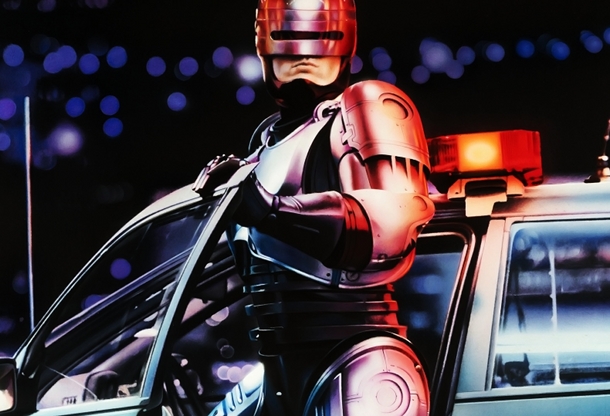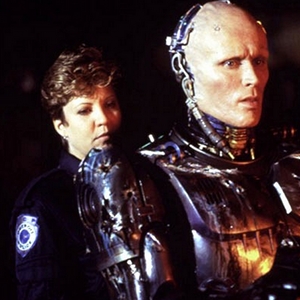The Films of Paul Verhoeven Review: RoboCop (1987)

Director: Paul Verhoeven
Country: USA
Genre: Action | Crime | Sci-Fi
Editor’s Notes: The following review is part of our coverage for TIFF’s Flesh + Blood: The Films of Paul Verhoeven which runs from January 24th to April 4th at TIFF Bell Lightbox. For more information on upcoming TIFF film series visit http://tiff.net and follow TIFF on Twitter at @TIFF_NET.
Sometime in the future, at least the future from 1987’s perspective, children will be glued to their TV sets by the adventures of T.J. Lazer, a space cowboy armed with a laser pistol and a devil-may-care attitude. It’s the sort of sci-fi hokum that entertains young boys and adults afraid of their own adulthood. It’s the sort of realm you might expect to find a robot cop.
But T.J. Lazer is the joke and RoboCop is the reality in Paul Verhoeven’s sci-fi classic; a triumphant action movie, moral tale and biting satire. The audaciousness of science fiction and the commercial nature of the action movie are realities that RoboCop proves itself to be aware of throughout, and also hypocritically revels in the freedoms they provide while critiquing their ills and inanities.
It’s the future, it’s Detroit, and capitalism has evolved into something bigger, crueler, and not entirely unrecognisable. Reaganomics have run rampant but the tickle-down funnel has become clogged with greed. Business is literally murder. OCP, a conglomerate so omnipresent and omnipotent it would take a merger of Time Warner Cable, Microsoft and GMC to match it today (OCP stands for Omni Consumer Products, providing every last item you might need), has become so powerful it has privatised the police force of Detroit to bail the struggling city out of a financial pit.

In Peter Weller, Verhoeven found a perfect everyman, whose death could move us within moments of meeting him, and whose square jaw and deep, authoritative but monotonous voice could make him an intimidating yet likable cyborg. While the film aims its cannons squarely at American corporate greed and consumerist addiction, it finds a curious depth in the journey of Weller’s Alex Murphy, who robbed of his life can perhaps still recover his humanity. An undeserved victim but an undesired resurrectee, Murphy’s battle against crime and his own killers is second to his fight against the chips in his head that would programme him to be more than a man, and also less than one.
An incredible supporting cast fills in for the lack of a full-faced leading man. Miguel Ferrer chews scenes apart as the morally repugnant but inherently appealing suit behind the RoboCop programme, while Ronny Cox is perfectly snide as his boardroom competitor Dick Jones. Nancy Allen adds her name to the list of Verhoeven’s confident, no-nonsense but not insensitive female heroes as partner cop Lewis; as the only person to have known both Murphy and RoboCop she plays the role of both sidekick and saviour. Kurtwood Smith, with eyes like bullets and a mouth full of blood, portrays villain Clarence Bodicker so calculated and cold that it helps make our mechanical hero look that much more human.
Verhoeven directs as straight as he can, eager to let the satirical undertones of Edward Neumeier and Michael Miner’s script remain as subconscious as possible. But the dialogue cuts like a knife, and the script bursts at the seams with quotable one-liners delivered with lip-licking gusto. Editing by Die Hard’s Frank Urioste punches hard without ever forcing the film to race ahead or draw to a crawl.
The score by Basil Poledouris, with a main theme exploding with industrial bravura and Wagnerian triumphalism, propels the semi-human drama forward, and is no doubt largely responsible for a generation of youngsters being unaware they were watching a decidedly political film disguised as an action movie.
But it’s the little details that make this film; the world-building moments and present-slandering assaults. So overwhelming is the commercialism of the future according to 1987 that during an escape from the film’s key action sequence, when any other film would have inserted a high-speed chase, RoboCop cuts to commercial. In the ad, a new car model is shown to be so impressive that it causes a rampaging Ray Harryhausen tyrannosaur’s eyes pop with Tex Avery surprise; the film returns with entertainment-packaged news coverage of the events unfolding, making RoboCop a closer relative of Network than The Terminator.
The future is created with matte paintings expanding on brutalist buildings that already littered the cities of North America, and some superb stop motion effects announce the policing droid ED-209 as one of science fiction’s most beloved creations. (That ED-209 is programmed to roar like a lion in combat mode and cry like a baby when malfunctioning heralds him as a precursor to the personalised cellphone ringtone, or the Tumblr reaction gif). Despite all his mechanical qualities, RoboCop’s finest upgrade is a spiked USB key in his wrist, that allows him to connect to computer mainframes, and doubles as a throat-bursting shiv.
The extreme violence of RoboCop has surely won it detractors, but that it is simultaneously so revolting and engrossing is undoubtedly what Neumeier and Verhoeven had in mind – the film revels in its contradictions, and exposing them in the audience. Its hero himself is a contradiction, neither man nor machine, but something more, and less, than those things, whose victory comes not in beating his programming, but by finding balance between it and his fragmented humanity.
97/100 ~ MASTERFUL. Verhoeven’s improbable masterpiece provides an outstanding entertainment while underhandedly chastising the audience for supporting the sort of system that allowed the film to be made in the first place. Regularly thought-provoking, hilarious and gut-churning, and at times all three at once, it balances art and action like few films could ever dream of doing so.












No comments:
Post a Comment